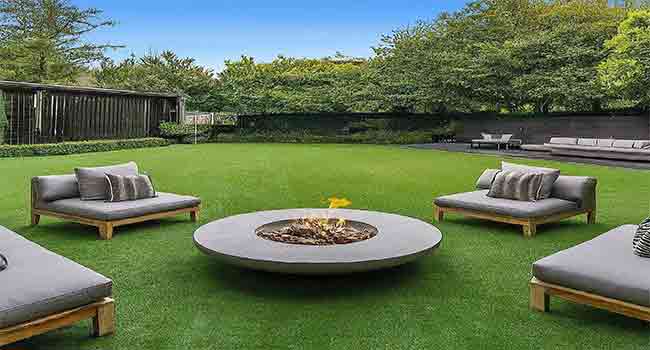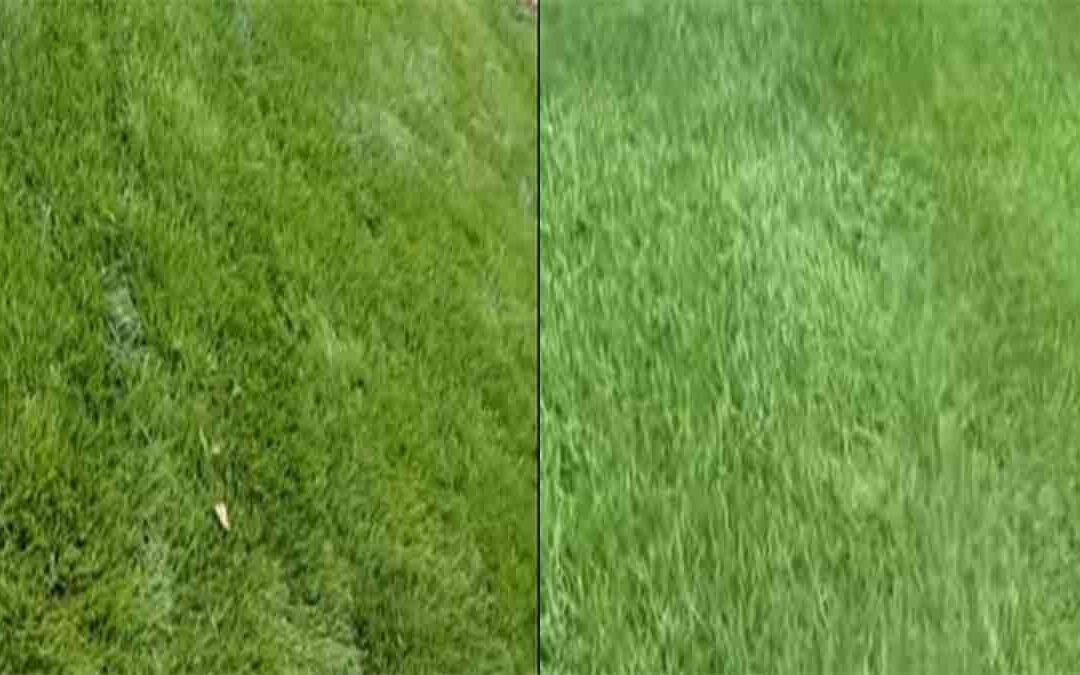Are you tired of battling brown patches, struggling with shade, or dealing with a lawn that can’t handle your family’s weekend football games? Choosing the wrong grass can lead to endless frustrations, like a lawn that burns in the sun, struggles in the shade, or requires constant upkeep. That’s why we’re diving into the ultimate showdown: zoysia grass vs. Bermuda grass.
But how do you know which one is right for you? Keep reading to uncover the pros and cons of each, along with expert advice to guide you towards a lawn that’s both beautiful and functional. By the end, you’ll be equipped to make an informed decision and create a lawn you’ll love.
Key Differences: Zoysia Grass vs Bermuda Grass
In the battle of zoysia grass vs. Bermuda grass, each contender brings unique strengths to the field. Let’s break down their key differences to determine which is the right fit for your lawn:
| Feature | Zoysia | Bermuda |
| Appearance | Fine-textured, dense, rich green | Medium-textured, aggressive growth, various shades of green |
| Climate Tolerance | Handles moderate shade, drought-tolerant (more cold-tolerant) | Thrives in full sun, heat-tolerant, dormant in extreme drought (less cold-tolerant) |
| Wear and Tear | Good wear tolerance, but slower recovery | Excellent wear tolerance, rapid recovery |
| Maintenance | Lower maintenance, less frequent mowing | Higher maintenance, more frequent mowing and fertilization |
| Cost | Generally more expensive to establish | More affordable option, but can be invasive |
Ideal Growing Conditions: Where Zoysia and Bermuda Thrive
While both zoysia and Bermuda grass flourish in warm climates, their ideal growing conditions vary slightly. Understanding these nuances will ensure you choose the right grass for your specific environment and maximize its potential.
| Feature | Zoysia | Bermuda |
| Soil | Prefers well-draining soil, adaptable to various soil types (pH 6.0-6.5) | Tolerates a wide range of soil conditions, including sandy soils (pH 5.8-7.0) |
| Sunlight | Does well in full sun to partial shade (4-6 hours of direct sunlight) | Requires full sun (6-8 hours of direct sunlight) |
| Water | Drought-tolerant, needs less watering once established | Requires regular watering, especially during hot, dry periods |
Choosing the Right Grass: Tailoring Your Lawn to Your Lifestyle
With a clearer picture of zoysia and Bermuda grass’s strengths and weaknesses, let’s explore how to choose the perfect match for your lawn. Consider your purpose, budget, lifestyle, and location to make an informed decision.
Purpose:
| Feature | Zoysia | Bermuda |
| Soil | Prefers well-draining soil, adaptable to various soil types (pH 6.0-6.5) | Tolerates a wide range of soil conditions, including sandy soils (pH 5.8-7.0) |
| Sunlight | Does well in full sun to partial shade (4-6 hours of direct sunlight) | Requires full sun (6-8 hours of direct sunlight) |
| Water | Drought-tolerant, needs less watering once established | Requires regular watering, especially during hot, dry periods |
Budget:
| Grass Type | Cost Considerations |
| Zoysia | Higher initial investment for sod or seed, lower long-term maintenance costs due to less frequent mowing and fertilization |
| Bermuda | More budget-friendly upfront, but potential for higher long-term maintenance costs due to frequent mowing and fertilization, as well as potential for spreading |
Homeowner Profile:
| Homeowner Profile | Ideal Grass Type | Why? |
| Busy Professional | Zoysia | Low-maintenance, requiring less frequent mowing and fertilization |
| Family with Pets | Bermuda | Durable, quick recovery from wear and tear, can handle high traffic |
| Avid Gardener | Bermuda | Responds well to frequent care and attention, fast growth rate allows for shaping and maintaining a pristine lawn |
Location & Climate:
| Climate Zone | Ideal Grass Type | Why? |
| Cool-Season or Transition Zone | Zoysia | Adaptable to cooler temperatures and moderate shade |
| Warm-Season | Bermuda | Thrives in hot, sunny climates with good drought tolerance |
Maintenance Tips for a Thriving Lawn: Nurturing Your Zoysia or Bermuda Oasis
| Grass Type | Mowing Height | Fertilization |
| Zoysia | 1-2 inches | 2-3 times per year |
| Bermuda | 0.5-1.5 inches | Every 4-6 weeks |
Seasonal Care:
- Zoysia: Apply winterizer fertilizer in fall.
- Bermuda: Overseed with cool-season grass in winter (in mild climates).
Common Problems & Solutions:
- Zoysia: Watch for large patch disease and treat with fungicide if needed.
- Bermuda: Monitor for grubs, armyworms, and fungal diseases.
FAQ: Your Questions About Zoysia vs. Bermuda Grass – Answered
Which grass is better for shade tolerance: Zoysia or Bermuda?
Zoysia grass is the clear winner in this category. It can tolerate moderate shade (4-6 hours of direct sunlight per day) while still maintaining healthy growth. Bermuda grass, on the other hand, craves full sun and struggles in shady conditions.
Which grass is more drought-tolerant?
Both Zoysia and Bermuda are considered drought-tolerant warm-season grasses. However, Zoysia generally requires less water once established and can bounce back more easily from drought stress compared to Bermuda.
Which grass is better for high-traffic areas?
If your lawn will endure heavy foot traffic, sports activities, or playful pets, Bermuda grass is the superior choice. Its robust nature and rapid recovery from damage make it ideal for high-traffic areas.
Is Zoysia or Bermuda better for cold climates?
Neither Zoysia nor Bermuda are cold-hardy grasses, but Zoysia tends to perform better in cooler temperatures than Bermuda. Zoysia can tolerate some frost and will remain green longer into fall, while Bermuda may go dormant and turn brown in colder climates.
Which grass is more affordable?
Bermuda grass is generally a more budget-friendly option compared to Zoysia. However, remember that the long-term costs of Bermuda can increase due to its higher maintenance requirements.
Can I overseed Zoysia or Bermuda with a cool-season grass?
Overseeding Bermuda with a cool-season grass in the fall is a common practice to maintain a green lawn during winter in milder climates. However, overseeding Zoysia is not recommended as it can hinder its growth and recovery in spring.
Do Zoysia and Bermuda attract pests and diseases?
Both grass types can be susceptible to pests and diseases, but they vary in their vulnerability. Zoysia is more prone to large patch disease, while Bermuda may face issues with grubs, armyworms, and fungal diseases. Proper maintenance and preventive measures can minimize these problems.
Which grass is better for the environment?
Both grasses can be environmentally friendly choices when managed responsibly. Zoysia’s drought tolerance can lead to water conservation, while Bermuda’s dense growth helps prevent soil erosion. However, both may require pesticides and fertilizers, so consider organic options for a greener approach.
Can I mix Zoysia and Bermuda grass in the same lawn?
It’s generally not recommended to mix Zoysia and Bermuda in the same lawn. They have different growth habits, maintenance needs, and textures, which can result in an uneven and visually unappealing lawn.

Conclusion: Zoysia vs. Bermuda – The Verdict for Your Dream Lawn
Choosing between zoysia and Bermuda grass boils down to understanding your lawn’s unique needs, your personal preferences, and your region’s climate.
Zoysia, with its low maintenance, shade tolerance, and elegant look, shines in the transition zone or southern regions. It’s perfect for homeowners seeking a beautiful lawn without the hassle of constant upkeep.
Bermuda grass, known for its durability, rapid recovery, and budget-friendly nature, is a champion for those in warmer climates with active lifestyles. It’s ideal for high-traffic areas and those who enjoy a vibrant, fast-growing lawn.
The best grass for you depends on your individual circumstances. Carefully consider your climate, soil type, sunlight exposure, desired maintenance level, and budget to make an informed decision.
Refer back to our comparison table and consider consulting a local lawn care professional to ensure you select the perfect grass that will thrive in your yard for years to come.
Read More
Grass Seed Types Demystified: Your Path to a Dream Lawn
How Long Grass Seed Take to Germinate? Comprehensive Guide
Grass Growth Temperatures Revealed: Lush Lawn in Any Climate
Does Grass Seed Go Bad Revitalize Your Lawn
Unbeatable Grass Seed for Clay Soil Success
Thriving Lawns: Master Grass Seed Rates Per Acre

